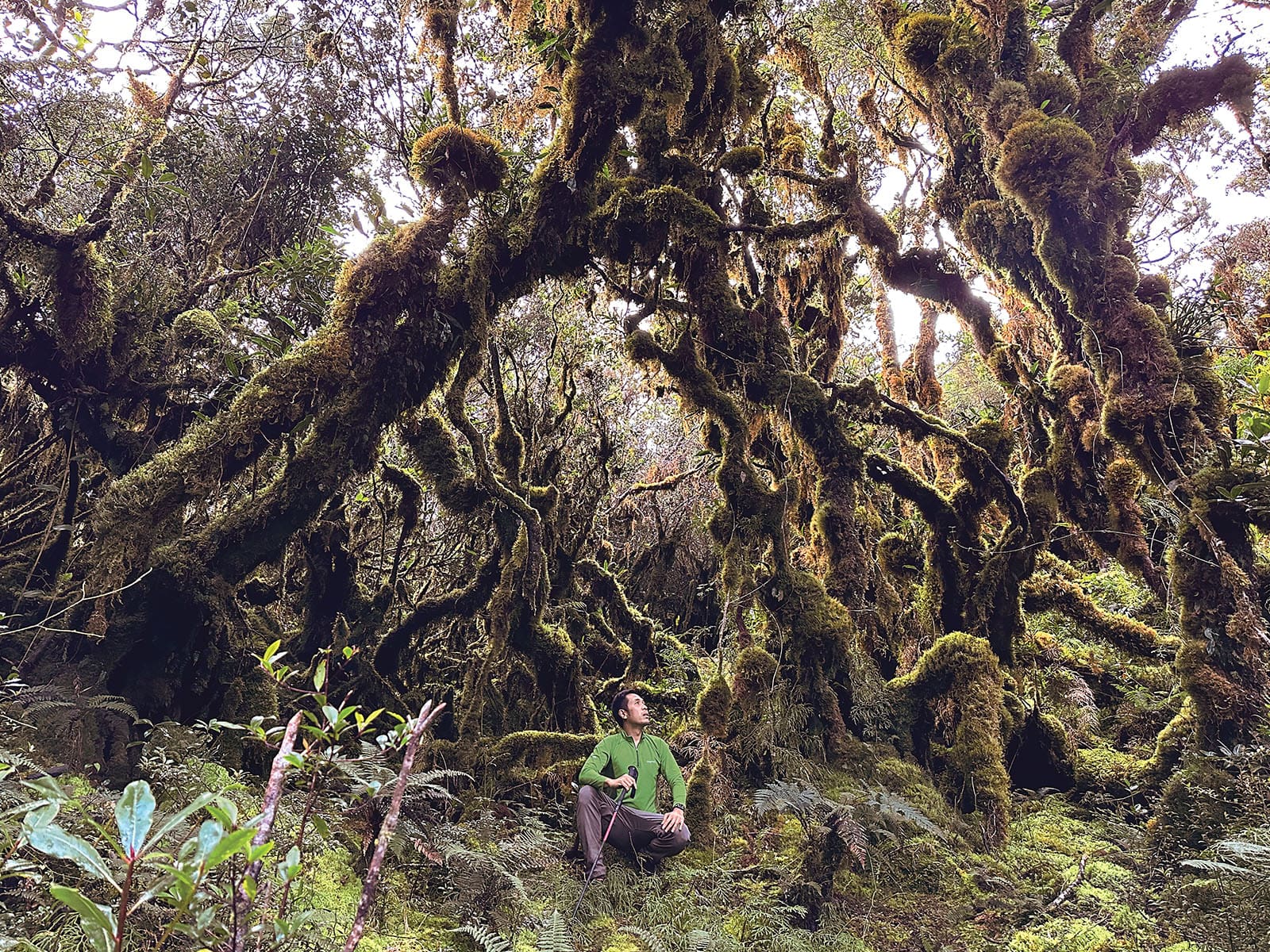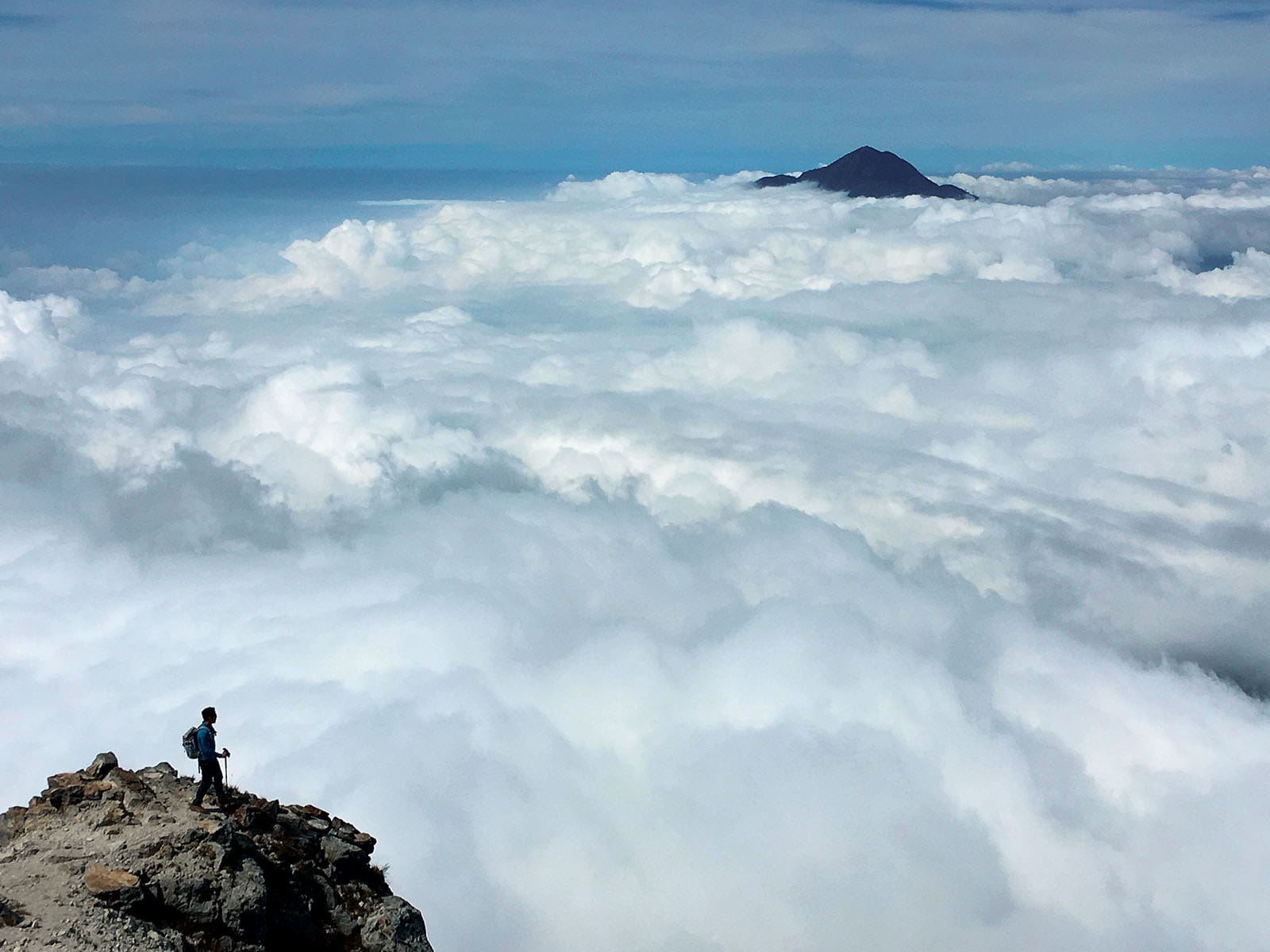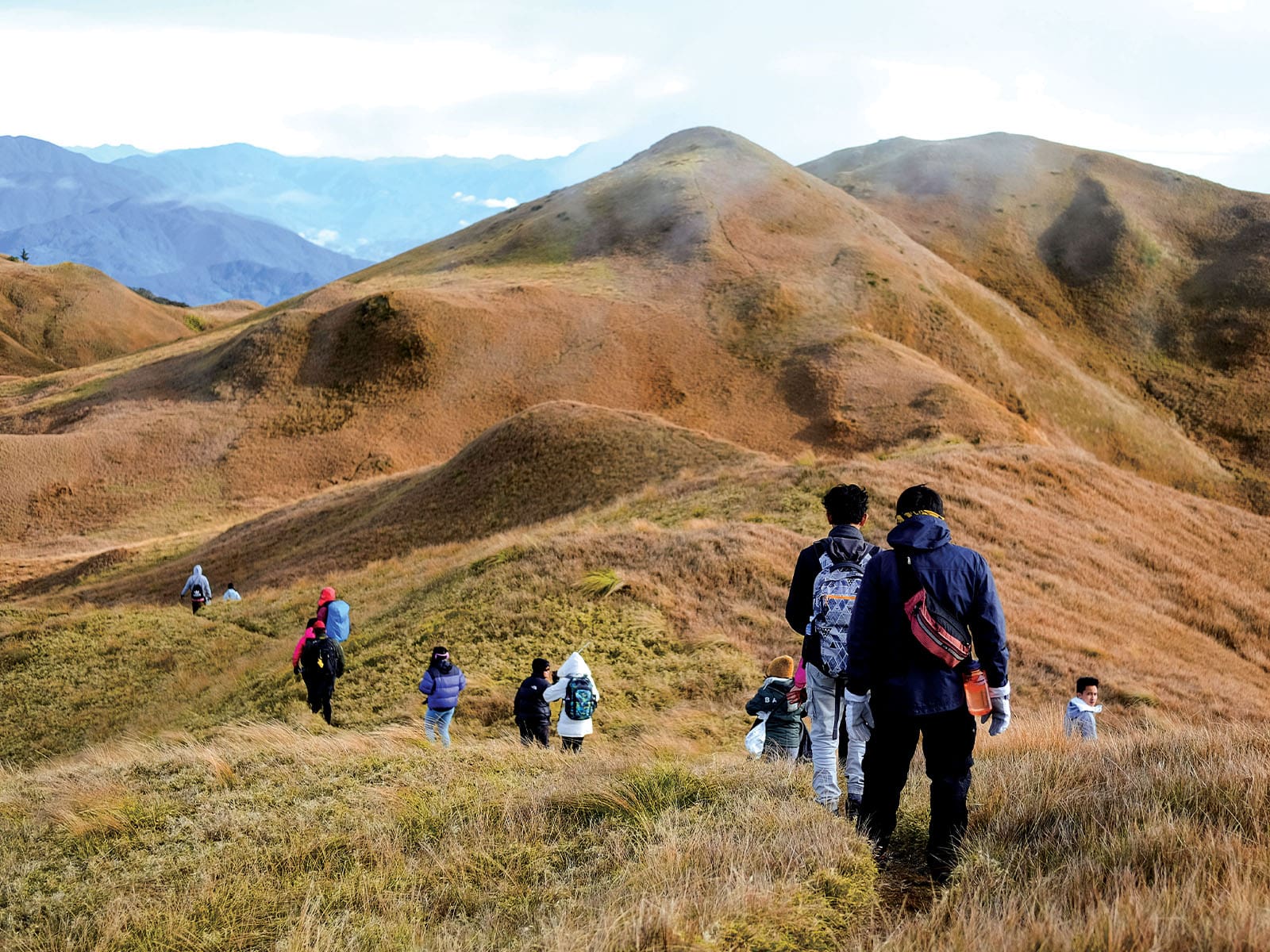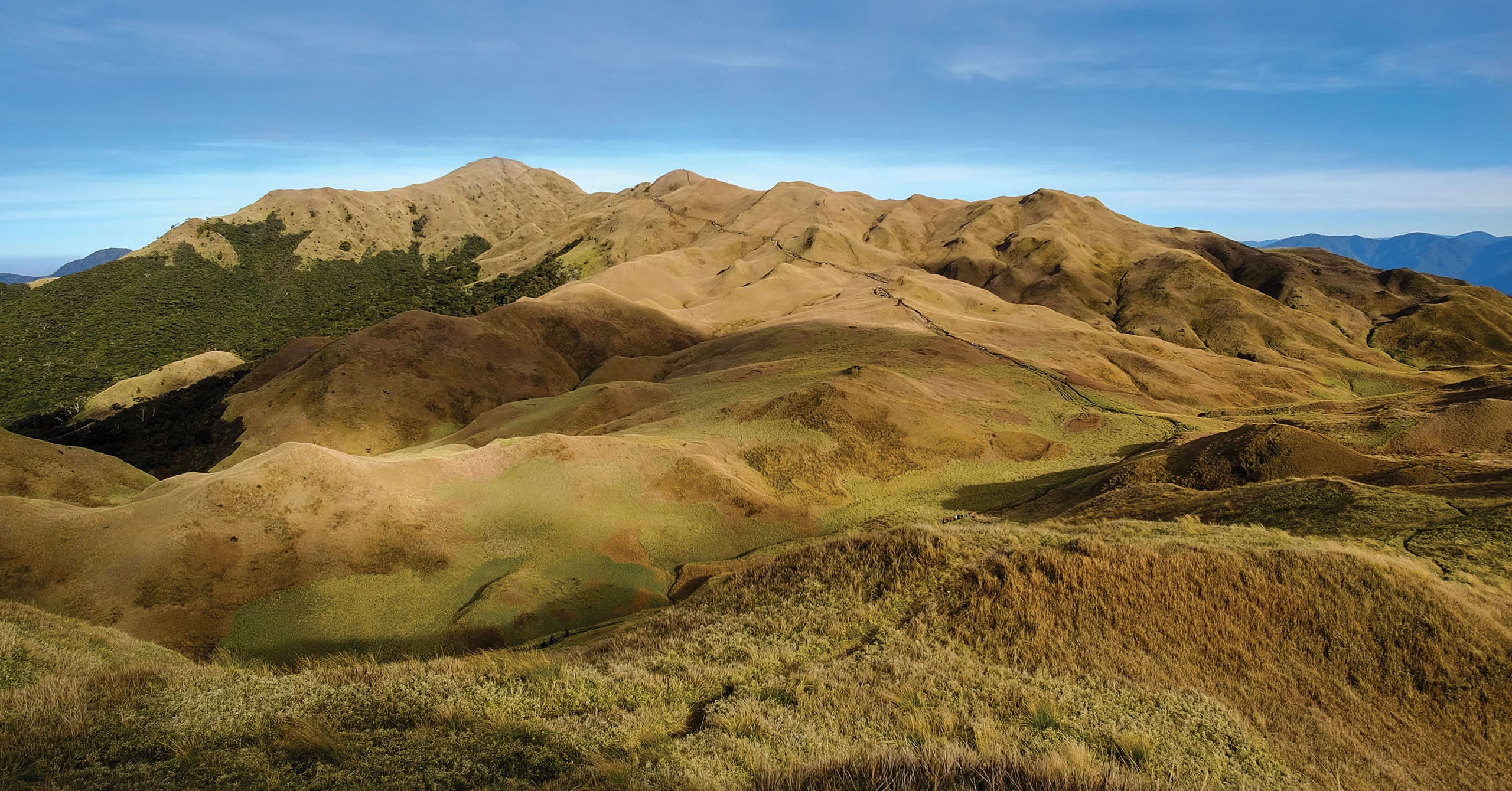At Mount Pulag. Photograph by Christopher Domingo
At Mount Pulag. Photograph by Christopher Domingo
Medical physician, anthropologist, and mountaineer Gideon Lasco shares how the mountains brings him happiness and wellness.
Seated at the back of our family car when I was a child, my eyes would always wander off to the mountains around us, from Mt. Makiling in my hometown of Los Baños and Mt. Banahaw, the highest peak in our region, to the mighty summits of the Cordilleras during those summer trips to Baguio. I wanted to know what lay within and beyond those giants of the earth, with various shapes and shades of blue.
And so, the mountains, from a young age, instilled in me a sense of wonder. I promised myself that I would go hiking when I grow older—at least as soon as my parents allowed me.
My father, an environmental scientist, accompanied me on my first hikes, and so did my mother. Forestry graduates both, my parents taught me valuable lessons about the value of the environment, and the importance of being responsible in the outdoors. Hiking became a bonding activity for us. For example, my mom and I would always remember—partly with fondness, partly with horror, the giant cobra we saw crossing the trail in Mt. Makiling. My father, younger brother, and I went up Mt. Kinabalu—the highest mountain in Malaysia—and it remains to be one of my happiest hiking experiences.

When I went to college in Manila, I joined a university-based mountaineering club, the UP Remontados. In the process, I learned the basics of hiking and camping, adding to the outdoor skills I learned as an Eagle Scout back in high school. Eventually, I organized hikes for my medical school classmates, and for a whole range of people, taking them not just to mountains in the Philippines but also some world-famous hikes like Mt. Fuji and Mt. Kilimanjaro. Even now, what excites me about hiking is the different people you get to meet along the trail, each with their own perspectives and stories to share.
There are many other encounters from the rebels and soldiers I met in Mindanao to the highland farmers and healers in the Cordilleras; from thru-hikers in the Appalachian Trail to tourists in the Swiss Alps. Hiking, if you come to think of it, takes you not just to mountains but also to cities, towns, villages: every mountaineer is necessarily a traveler. And with traveling comes education: we learn about our country beyond the cities that we’ve grown familiar with, and we get to know the people, their joys and miseries, their struggles and their dreams. In this way, hiking provides a sense of connectedness to the world around me: to my family, to my friends, to my country, and even to distant lands. From mere places on a map, they become part of our lives.

Technology has allowed virtual forms of staying connected, and some even prefer to live-vlog themselves from peaks and campsites. This ‘hyperconnectivity’ notwithstanding is what hiking offers us, a respite from our everyday lives which is why I have learned to accept, and even be thankful for the times when there is no signal. I think we all need this kind of break once in a while. When was the last time you actually looked at the moon and contemplated its beauty? Solar and lunar eclipses happen rarely, but oftentimes, we allow our everyday lives to eclipse nature and the wisdom it can give us.
On the other hand, when I am on the mountain, I am far from the comforts of modernity, from the noise and the traffic, from the news and all the distractions. Amid the playlist of birds and the glow of fireflies, I learn to appreciate small things like being dry inside a tent or being wet under a beautiful waterfall. More importantly, amid our epidemic of mental health issues, the mountains make you focus on the things that really matter. Walking in the shadow of Mt. Apo’s century-old trees, or in the vastness of Mt. Pulag’s dwarf bamboo slopes, you realize how small our anxieties are, while the sheer grandeur of the mountain itself can humble us. By providing a sanctuary for the spirit and metaphors for life, the mountains give us a sense of peace.
A sense of wonder, a sense of connectedness, and a sense of peace, these are just a few of the things that the mountains have given me. There are certainly others. Increasingly, as I grow older, I have come to see health benefits of hiking; more than an aerobic exercise that is good for cardiovascular and musculoskeletal health, it also encourages a lifestyle of fitness and wellness. And perhaps more importantly, the mountains themselves are places of healing, with various research increasingly supporting what we already intuitively know: Nature can make us healthier physically, mentally, and spiritually.

Sharing my passion for the mountains is my way of paying these benefits forward. I want people to discover the mountains because of the good that it can give them. But I also want people to discover the mountains for the mountains’ own good, believing that appreciation is the best way to nurture a concern for the environment. Indeed, if only people get to see more of our natural heritage, the world will be a much better place.
Like life itself, climbing mountains is not all sunshine and rainbows (although you see a lot of beautiful rainbows out there). The pictures may conjure an image of paradise, but the mountains are not always a comfortable place. Insects and leeches will bite you. The heat and the cold, as well as the distance and the altitude, will test your body and spirit. It can be lonely out there, too, and certainly there were many times when I longed for home. But when you learn to find happiness in the deep forests, in the blue mountains, on high peak and endless trail; when your heart learns to sing through the snow and the rain, the smile that comes to you when you see the mountain will follow you to the peak, and it will never leave you, even after the hike is done.
And you will keep coming back.

